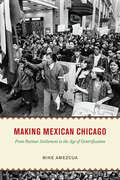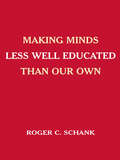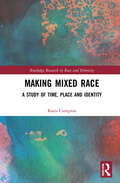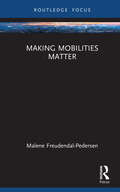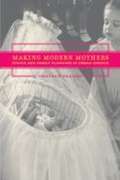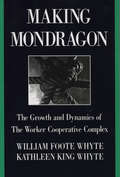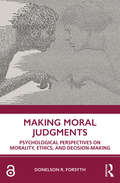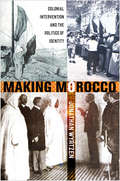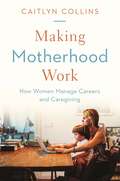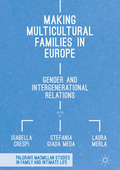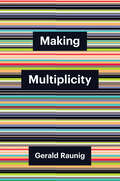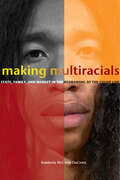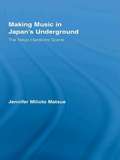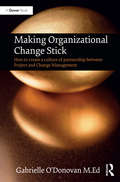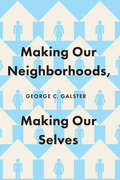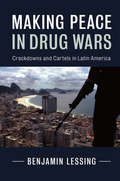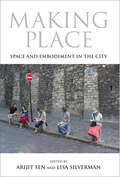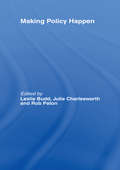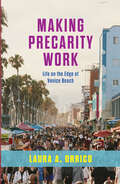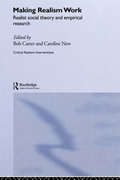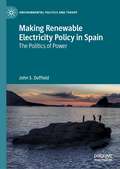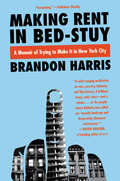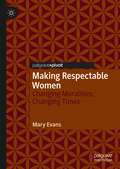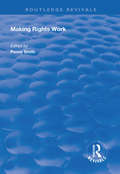- Table View
- List View
Making Mexican Chicago: From Postwar Settlement to the Age of Gentrification (Historical Studies of Urban America)
by Mike AmezcuaAn exploration of how the Windy City became a postwar Latinx metropolis in the face of white resistance. Though Chicago is often popularly defined by its Polish, Black, and Irish populations, Cook County is home to the third-largest Mexican-American population in the United States. The story of Mexican immigration and integration into the city is one of complex political struggles, deeply entwined with issues of housing and neighborhood control. In Making Mexican Chicago, Mike Amezcua explores how the Windy City became a Latinx metropolis in the second half of the twentieth century. In the decades after World War II, working-class Chicago neighborhoods like Pilsen and Little Village became sites of upheaval and renewal as Mexican Americans attempted to build new communities in the face of white resistance that cast them as perpetual aliens. Amezcua charts the diverse strategies used by Mexican Chicagoans to fight the forces of segregation, economic predation, and gentrification, focusing on how unlikely combinations of social conservatism and real estate market savvy paved new paths for Latinx assimilation. Making Mexican Chicago offers a powerful multiracial history of Chicago that sheds new light on the origins and endurance of urban inequality.
Making Mexican Chicago: From Postwar Settlement to the Age of Gentrification (Historical Studies of Urban America)
by Mike AmezcuaAn exploration of how the Windy City became a postwar Latinx metropolis in the face of white resistance. Though Chicago is often popularly defined by its Polish, Black, and Irish populations, Cook County is home to the third-largest Mexican-American population in the United States. The story of Mexican immigration and integration into the city is one of complex political struggles, deeply entwined with issues of housing and neighborhood control. In Making Mexican Chicago, Mike Amezcua explores how the Windy City became a Latinx metropolis in the second half of the twentieth century. In the decades after World War II, working-class Chicago neighborhoods like Pilsen and Little Village became sites of upheaval and renewal as Mexican Americans attempted to build new communities in the face of white resistance that cast them as perpetual aliens. Amezcua charts the diverse strategies used by Mexican Chicagoans to fight the forces of segregation, economic predation, and gentrification, focusing on how unlikely combinations of social conservatism and real estate market savvy paved new paths for Latinx assimilation. Making Mexican Chicago offers a powerful multiracial history of Chicago that sheds new light on the origins and endurance of urban inequality.
Making Minds Less Well Educated Than Our Own
by Roger C. SchankIn the author's words: "This book is an honest attempt to understand what it means to be educated in today's world." His argument is this: No matter how important science and technology seem to industry or government or indeed to the daily life of people, as a society we believe that those educated in literature, history, and other humanities are in some way better informed, more knowing, and somehow more worthy of the descriptor "well educated." This 19th-century conception of the educated mind weighs heavily on our notions on how we educate our young. When we focus on intellectual and scholarly issues in high school as opposed to issues, such as communications, basic psychology, or child raising, we are continuing to rely on outdated notions of the educated mind that come from elitist notions of who is to be educated and what that means. To accommodate the realities of today's world it is necessary to change these elitist notions. We need to rethink what it means to be educated and begin to focus on a new conception of the very idea of education. Students need to learn how to think, not how to accomplish tasks, such as passing standardized tests and reciting rote facts. In this engaging book, Roger C. Schank sets forth the premises of his argument, cites its foundations in the Great Books themselves, and illustrates it with examples from an experimental curriculum that has been used in graduate schools and with K-12 students. Making Minds Less Well Educated Than Our Own is essential reading for scholars and students in the learning sciences, instructional design, curriculum theory and planning, educational policy, school reform, philosophy of education, higher education, and anyone interested in what it means to be educated in today's world.
Making Mixed Race: A Study of Time, Place and Identity (Routledge Research in Race and Ethnicity)
by Karis CampionBy examining Black mixed-race identities in the city through a series of historical vantage points, Making Mixed Race provides in-depth insights into the geographical and historical contexts that shape the possibilities and constraints for identifications. Whilst popular representations of mixed-race often conceptualise it as a contemporary phenomenon and are couched in discourses of futurity, this book dislodges it from the current moment to explore its emergence as a racialised category, and personal identity, over time. In addition to tracing the temporality of mixed-race, the contributions show the utility of place as an analytical tool for mixed-race studies. The conceptual framework for the book – place, time, and personal identity – offers a timely intervention to the scholarship that encourages us to look outside of individual subjectivities and critically examine the structural contexts that shape Black mixed-race lives. The book centres around the life histories of 37 people of Mixed White and Black Caribbean heritage born between 1959 and 1994, in Britain’s second-largest city, Birmingham. The intimate life portraits of mixed identity reveal how colourism, family, school, gender, whiteness, racism, and resistance, have been experienced against the backdrop of post-war immigration, Thatcherism, the ascendency of Black diasporic youth cultures, and contemporary post-race discourses. It will be of interest to researchers, postgraduate and undergraduate students who work on (mixed) race and ethnicity studies in academic areas including geographies of race, youth identities/cultures, gender, colonial legacies, intersectionality, racism, and colourism.
Making Mobilities Matter (Changing Mobilities)
by Malene Freudendal-PedersenMaking Mobilities Matter explores the interconnection between everyday practice and policy and planning in urban mobilities. It develops a theoretical framework for understanding everyday life and its mobilities in a mobile risk society and critiques the technocratic views that still dominate transport politics and research. Recognizing the importance of culture and everyday life in shaping urban mobilities, it examines how contemporary communities exist, expand, and are sustained through localized and virtual forms of sharing responsibility, exchanging life experiences, creating meaning, and giving ontological security to people’s lives. It also offers perspectives on the emotional aspect of mobilities in everyday life and how utopias can respond to these emotions. Making Mobilities Matter ends with a discussion of the prospects for urban mobilities in the future and how these issues are vital in battling climate change. Making Mobilities Matter is essential reading for students and researchers seeking to understand the importance of mobilities in sustainable urban development and tackling climate change.
Making Modern Mothers: Ethics and Family Planning in Urban Greece
by Heather PaxsonIn Greece, women speak of mothering as "within the nature" of a woman. But this durable association of motherhood with femininity exists in tension with the highest incidence of abortion and one of the lowest fertility rates in Europe. In this setting, how do women think of themselves as proper individuals, mothers, and Greek citizens? In this anthropological study of reproductive politics and ethics in Athens, Greece, Heather Paxson tracks the effects of increasing consumerism and imported biomedical family planning methods, showing how women's "nature" is being transformed to meet crosscutting claims of the contemporary world. Locating profound ambivalence in people's ethical evaluations of gender and fertility control, Paxson offers a far-reaching analysis of conflicting assumptions about what it takes to be a good mother and a good woman in modern Greece, where assertions of cultural tradition unfold against a backdrop of European Union integration, economic struggle, and national demographic anxiety over a falling birth rate.
Making Mondragón: The Growth and Dynamics of the Worker Cooperative Complex
by William Foote Whyte Kathleen King WhyteSince its founding in 1956 in Spain's Basque region, the Mondragón Corporation has been a touchstone for the international cooperative movement. Its nearly three hundred companies and organizations span areas from finance to education. In its industrial sector Mondragón has had a rich experience over many years in manufacturing products as varied as furniture, kitchen equipment, machine tools, and electronic components and in printing, shipbuilding, and metal smelting. Making Mondragón is a groundbreaking look at the history of worker ownership in the Spanish cooperative. First published in 1988, it remains the best source for those looking to glean a rich body of ideas for potential adaptation and implementation elsewhere from Mondragón's long and varied experience. This second edition, published in 1991, takes into account the major structural and strategic changes that were being implemented in 1990 to allow the enterprise to compete successfully in the European common market. Mondragón has created social inventions and developed social structures and social processes that have enabled it to overcome some of the major obstacles faced by other worker cooperatives in the past. William Foote Whyte and Kathleen King Whyte describe the creation and evolution of the Mondragón cooperatives, how they have changed through decades of experience, and how they have struggled to maintain a balance between their social commitments and economic realities. The lessons of Mondragón apply most clearly to worker cooperatives and other employee-owned firms, but also extend to regional development and stimulating and supporting entrepreneurship, whatever the form of ownership.
Making Moral Judgments: Psychological Perspectives on Morality, Ethics, and Decision-Making
by Donelson ForsythThis fascinating new book examines diversity in moral judgements, drawing on recent work in social, personality, and evolutionary psychology, reviewing the factors that influence the moral judgments people make. Why do reasonable people so often disagree when drawing distinctions between what is morally right and wrong? Even when individuals agree in their moral pronouncements, they may employ different standards, different comparative processes, or entirely disparate criteria in their judgments. Examining the sources of this variety, the author expertly explores morality using ethics position theory, alongside other theoretical perspectives in moral psychology, and shows how it can relate to contemporary social issues from abortion to premarital sex to human rights. Also featuring a chapter on applied contexts, using the theory of ethics positions to gain insights into the moral choices and actions of individuals, groups, and organizations in educational, research, political, medical, and business settings, the book offers answers that apply across individuals, communities, and cultures. Investigating the relationship between people’s personal moral philosophies and their ethical thoughts, emotions, and actions, this is fascinating reading for students and academics from psychology and philosophy and anyone interested in morality and ethics.
Making Morocco: Colonial Intervention and the Politics of Identity
by Jonathan WyrtzenHow did four and a half decades of European colonial intervention transform Moroccan identity? As elsewhere in North Africa and in the wider developing world, the colonial period in Morocco (1912–1956) established a new type of political field in which notions about and relationships among politics and identity formation were fundamentally transformed. Instead of privileging top-down processes of colonial state formation or bottom-up processes of local resistance, the analysis in Making Morocco focuses on interactions between state and society. Jonathan Wyrtzen demonstrates how, during the Protectorate period, interactions among a wide range of European and local actors indelibly politicized four key dimensions of Moroccan identity: religion, ethnicity, territory, and the role of the Alawid monarchy. This colonial inheritance is reflected today in ongoing debates over the public role of Islam, religious tolerance, and the memory of Morocco's Jews; recent reforms regarding women’s legal status; the monarchy’s multiculturalist recognition of Tamazight (Berber) as a national language alongside Arabic; the still-unresolved territorial dispute over the Western Sahara; and the monarchy’s continued symbolic and practical dominance of the Moroccan political field.
Making Motherhood Work: How Women Manage Careers and Caregiving
by Caitlyn CollinsA moving, cross-national account of working mothers’ daily lives—and the revolution in public policy and culture needed to improve themThe work-family conflict that mothers experience today is a national crisis. Women struggle to balance breadwinning with the bulk of parenting, and stress is constant. Social policies don’t help. Of all Western industrialized countries, the United States ranks dead last for supportive work-family policies: No federal paid parental leave. The highest gender wage gap. No minimum standard for vacation and sick days. The highest maternal and child poverty rates. Can American women look to European policies for solutions? Making Motherhood Work draws on interviews that sociologist Caitlyn Collins conducted over five years with 135 middle-class working mothers in Sweden, Germany, Italy, and the United States. She explores how women navigate work and family given the different policy supports available in each country.Taking readers into women’s homes, neighborhoods, and workplaces, Collins shows that mothers’ desires and expectations depend heavily on context. In Sweden—renowned for its gender-equal policies—mothers assume they will receive support from their partners, employers, and the government. In the former East Germany, with its history of mandated employment, mothers don’t feel conflicted about working, but some curtail their work hours and ambitions. Mothers in western Germany and Italy, where maternalist values are strong, are stigmatized for pursuing careers. Meanwhile, American working mothers stand apart for their guilt and worry. Policies alone, Collins discovers, cannot solve women’s struggles. Easing them will require a deeper understanding of cultural beliefs about gender equality, employment, and motherhood. With women held to unrealistic standards in all four countries, the best solutions demand that we redefine motherhood, work, and family.Making Motherhood Work vividly demonstrates that women need not accept their work-family conflict as inevitable.
Making Multicultural Families in Europe: Gender And Generational Relations (Palgrave Macmillan Studies in Family and Intimate Life)
by Isabella Crespi Stefania Giada Meda Laura MerlaThis edited collection explores family relations in two types of 'migrant families' in Europe: mixed families and transnational families. Based on in-depth qualitative fieldwork and large surveys, the contributors analyse gender and intergenerational relations from a variety of standpoints and migratory flows. In their examination of family life in a migratory context, the authors develop theoretical approaches from the social sciences that go beyond migration studies, such as intersectionality, the solidarity paradigm, care circulation, reflexive modernization and gender convergence theory. Making Multicultural Families in Europe will be of interest to students and scholars across a range of disciplines including migration and transnationalism studies, family studies, intergenerational studies, gender studies, cultural studies, development studies, globalization studies, ethnic studies, gerontology studies, social network analysis and social work.
Making Multiplicity (Theory Redux)
by Gerald RaunigIn this poetical-philosophical manifesto, Gerald Raunig develops a materialist philosophy of multiplicity. On the basis of seventeen conceptual innovations – from windy kin to transversal intellect, from dissemblage to technecologies, from minor masculinity to condividual revolution – Raunig reformulates the question of revolutionary multiplicity. Always staying close to contemporary social struggles and movements, the book starts from the contention that we are in need of a storm against identitarian domination, unification, and homogeneity. Raunig argues that the conceptual and political experimentations with multiplicity around and after 1968 did not go far enough: today, anti-identitarian, queer, and multitudinarian positions should not just be defended but pushed further, over unexpected folds and along the flattest surfaces, beyond previous approaches and previous historical experiences. Making Multiplicity is a conceptual manifesto which sets a new tone in poststructural philosophy. The seventeen concepts developed here form an assemblage that invites us to think, read, write, and indeed, make multiplicity.
Making Multiracials: State, Family, and Market in the Redrawing of the Color Line
by Kimberly Mcclain DacostaMaking Multiracials tells the story of the social movement that emerged around mixed race identity in the 1990s. Organizations for interracial families and mixed race people--groups once loosely organized and only partially aware of each other--proliferated. What was once ignored, treated as taboo, or just thought not to exist quickly became part of the cultural mainstream. How did this category of people come together? Why did the movement develop when it did? What is it about "being mixed" that constitutes a compelling basis for activism? Drawing on extensive interviews and fieldwork, the author answers these questions to show how multiracials have been "made" through state policy, family organizations, and market forces.
Making Music in Japan's Underground: The Tokyo Hardcore Scene (East Asia: History, Politics, Sociology and Culture #3)
by Jennifer Milioto MatsueGrounded in the fields of Ethnomusicology, Anthropology, Popular Music Studies, and Japanese Studies, this book explores the underground Tokyo hardcore scene, ultimately asking what play as resistance through performance of the scene tells us about Japanese society in general. Matsue highlights the complicated positioning of young adult Japanese in contemporary Japan as they negotiate both increasing social demands and increasing problems in society at large. Further drawing on theories of play, identity building, and the construction of gender, all informed by the increasingly influential field of Performance Studies, the book offers a highly interdisciplinary look at the importance of musical scenes for expressing resistance at the turn of the 21st century. Within the underground Tokyo hardcore scene this resistance is expressed through play with individual and collective identity, in intimate and potentially illicit spaces, with an arguably challenging sound and performance style.
Making Organizational Change Stick: How to create a culture of partnership between Project and Change Management
by Gabrielle O'DonovanBusiness needs change. And it needs it in ways, at a rate and on a scale that is unprecedented. Current success rates for organizational change projects are dismal and are likely to remain so until organizations reinvent their approach to project delivery, and learn how to integrate Change Management and Project Management successfully. In this ground-breaking and innovative book, Gabrielle O Donovan shows you how to design strategy, structures and processes to realize this integration and deliver sustainable and commercially powerful business change. She opens the book by providing the context, describing both the problem and the solution; how the disconnect between Project Management and Change Management feeds the 40–70 per cent failure rate and the laying of many a dud egg; and how cross-discipline integration efforts thus far have only addressed the tip of the iceberg, ignoring the subterranean cultural element that can divide or unite project teams. From there, she profiles Project Management and Change Management in turn and, crucially, the value and service propositions of these respective disciplines and the different theories, models and tools they employ. In the second half of the book she makes a ‘Project and Change Partnership’ (PCP) culture explicit and measurable, articulating those cultural assumptions that will support an effective alliance and that relate to those universal problems all organizations face regarding the macro environment, external adaptability and survival, and internal integration. From there, she describes how Project Managers and Change Managers can cooperate daily by dividing work packages and activities throughout the end-to-end project lifecycle. Project leaders who instill a PCP culture will benefit from the unique value that these interdependent disciplines bring to project delivery. It is they who will lay golden eggs and realize business benefits. Making Organizational Change Stick is written for project leaders, Change Managers, Project/Programme Managers, design thinkers, business architects and anyone concerned with business change.
Making Our Neighborhoods, Making Our Selves
by George C. GalsterUrban theorists have tried for decades to define exactly what a neighborhood is. But behind that daunting existential question lies a much murkier problem: never mind how you define them—how do you make neighborhoods productive and fair for their residents? In Making Our Neighborhoods, Making Our Selves, George Galster delves deep into the question of whether American neighborhoods are as efficient and equitable as they could be—socially, financially, and emotionally—and, if not, what we can do to change that. Galster aims to redefine the relationship between places and people, promoting specific policies that reduce inequalities in housing markets and beyond. Drawing on economics, sociology, geography, and psychology, Making Our Neighborhoods, Making Our Selves delivers a clear-sighted explanation of what neighborhoods are, how they come to be—and what they should be.
Making Peace in Drug Wars: Crackdowns and Cartels in Latin America
by Benjamin LessingOver the past thirty years, a new form of conflict has ravaged Latin America's largest countries, with well-armed drug cartels fighting not only one another but the state itself. In Colombia, Mexico, and Brazil, leaders cracked down on cartels in hopes of restoring the rule of law and the state's monopoly on force. Instead, cartels fought back - with bullets and bribes - driving spirals of violence and corruption that make mockeries of leaders' state-building aims. Fortunately, some policy reforms quickly curtailed cartel-state conflict, but they proved tragically difficult to sustain. Why do cartels fight states, if not to topple or secede from them? Why do some state crackdowns trigger and exacerbate cartel-state conflict, while others curb it? This study argues that brute-force repression generates incentives for cartels to fight back, while policies that condition repression on cartel violence can effectively deter cartel-state conflict. The politics of drug war, however, make conditional policies all too fragile.
Making Place: Space And Embodiment In The City
by Arijit Sen Lisa SilvermanSpace and place have become central to analysis of culture and history in the humanities and social sciences. Making Place examines how people engage the material and social worlds of the urban environment via the rhythms of everyday life and how bodily responses are implicated in the making and experiencing of place. The contributors introduce the concept of spatial ethnography, a new methodological approach that incorporates both material and abstract perspectives in the study of people and place, and encourages consideration of the various levels--from the personal to the planetary--at which spatial change occurs. The book's case studies come from Costa Rica, Colombia, India, Austria, Italy, the United Kingdom, and the United States.
Making Policy Happen
by Leslie Budd‘Policy work’ is increasingly conducted by public managers at different levels of seniority, and in a variety of settings. This significant collection of readings focuses on the discussion of how policy work happens, whether that involves bringing a policy-making process to fruition or the implementation of policy. The ideas included here draw on many different academic disciplines including economics, political science, social policy, international relations, organizational behaviour and psychology. The book is divided into four key sections, each with an introduction by the editors, covering: understanding policy processesgovernance contextsinstruments and discoursesleadership in policy work. This key text equips the reader with the fundamental knowledge and the essential ability required to critically analyze the key theoretical, conceptual and operational approaches to the development and management of public policy. Containing timeless papers that are the building blocks of understanding public policy, this important volume allows the reader to analyze new issues in appropriate contexts and one’s own setting.
Making Precarity Work: Life on the Edge of Venice Beach
by Laura A. OrricoShows how the precarious workers of Venice Beach—without help from the government—work together to create a safety net for themselves. In Making Precarity Work, sociologist Laura A. Orrico shows how Los Angeles’s Venice Beach boardwalk, which is a magnet for tourists, is also a workplace, one that wouldn’t exist without the motley crew of people selling art, drinking, performing, using drugs, and working odd jobs who gather daily to engage in varied activities, from selling crafts to minding each other’s wares and asking for spare change. Throughout the book, Orrico lifts up this workplace as a collective accomplishment, demonstrating how it can be a safety net to manage insecurity and inequality for those opting into its flexible and precarious structure, as well as how the LA government’s efforts to stabilize this work often disrupt the success of this collaborative and creative ecosystem. She also presents the ways this work can exacerbate those very inequalities. Sharing the personal stories of boardwalk workers, Orrico considers these juxtaposed realities and asks her audience to question how we can and should respond to a society whose best option for the disadvantaged is precarity.
Making Realism Work: Realist Social Theory and Empirical Research
by Bob Carter Caroline NewIn this innovative book, theorists and researchers from various social science disciplines explore the potential of realist social theory for empirical research. The examples are drawn from a wide range of fields health and medicine, crime, housing, sociolinguistics, development theory and deal with issues such as causality, probability, and reflexivity in social science. Varied and lively contributions relate central methodological issues to detailed accounts of research projects which adopt a realist framework. Making Realism Work provides an accessible discussion of a significant current in contemporary social science and will be of interest to social theorists and social researchers alike.
Making Renewable Electricity Policy in Spain: The Politics of Power (Environmental Politics and Theory)
by John S. DuffieldThis book examines the politics of renewable electricity policy in democratic Spain. It provides the first comprehensive political analysis of how and why successive Spanish governments have increased or reduced support for renewable power, especially wind and solar. In particular, it identifies the key influences that have been brought to bear on decision making by the core executive as it has sought to determine the appropriate role of renewable sources in the country’s electricity mix. Following the introduction, four chapters chart the dramatic rise, fall, and, most recently, renewed rise in support for utility-scale renewable power, from the early 1980s to the present. Another chapter details the decade-long political struggle over the regulation of small-scale distributed renewable electricity generation. The penultimate chapter explores the future prospects for renewable power in Spain, and the final chapter offers an overarching explanation of the patterns of policy outcomes observed.
Making Rent in Bed-Stuy: A Memoir of Trying to Get By in New York City
by Brandon HarrisA young African American millennial filmmaker’s funny, sometimes painful, true-life coming-of-age story of trying to make it in New York City—a chronicle of poverty and wealth, creativity and commerce, struggle and insecurity, and the economic and cultural forces intertwined with "the serious, life-threatening process" of gentrification.Making Rent in Bed-Stuy explores the history and sociocultural importance of Bedford-Stuyvesant, Brooklyn’s largest historically black community, through the lens of a coming-of-age young American negro artist living at the dawn of an era in which urban class warfare is politely referred to as gentrification. Bookended by accounts of two different breakups, from a roommate and a lover, both who come from the white American elite, the book oscillates between chapters of urban bildungsroman and a historical examination of some of Bed-Stuy’s most salient aesthetic and political legacies.Filled with personal stories and a vibrant cast of iconoclastic characters— friends and acquaintances such as Spike Lee; Lena Dunham; and Paul MacCleod, who made a living charging $5 for a tour of his extensive Elvis collection—Making Rent in Bed-Stuy poignantly captures what happens when youthful idealism clashes head-on with adult reality.Melding in-depth reportage and personal narrative that investigates the disappointments and ironies of the Obama era, the book describes Brandon Harris’s radicalization, and the things he lost, and gained, along the way.
Making Respectable Women: Changing Moralities, Changing Times
by Mary EvansThis book studies the ways in which the assessment of being or not being ‘respectable’ has been applied to women in the UK in the past one hundred and fifty years. Mary Evans shows how the term ‘respectable’ has changed and how, most importantly, the basis of the ways in which the respectability of women has been judged has shifted from a location in women’s personal, domestic and sexual behaviour to that of how women engage in contemporary forms of citizenship, not the least of which is paid work. This shift has important social and political implications that have seldom been explored: amongst these are the growing marginalisation of the validation of the traditional care work of women, the assumption that paid work is implicitly and inevitably empowering and the complex ways in which respectability and conformity to highly sexualised conventions about female appearance have been normalised. Making Respectable Women makes use of archive material to show how the changing definition of a moral and social concept can have an impact on both the behaviour and the choices of individuals and the operations of institutional power. It will be of interest to students and scholars across the humanities and social sciences.
Making Rights Work (Routledge Revivals)
by Penny SmithFirst published in 1999, this edited collection of essays explores various perspectives on making rights work in South Africa, Canada, the USA and the UK, along with pieces on gender, political, LGBT and British legal rights. The volume was inspired by recent strides forward at the time, including the South African Constitution adopted on the 8th of May 1996, and sought to provide a snapshot of rights debates at the time.
